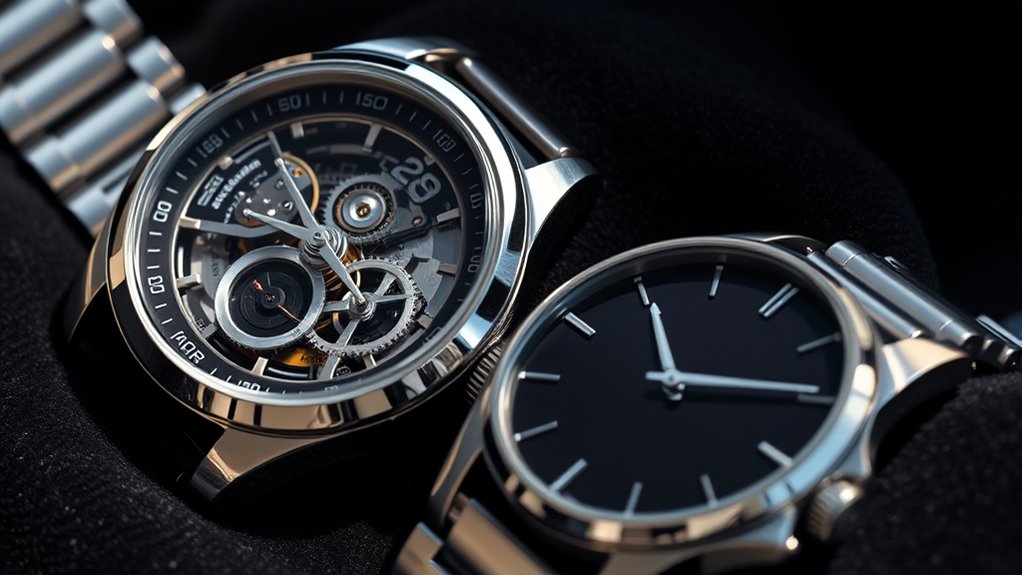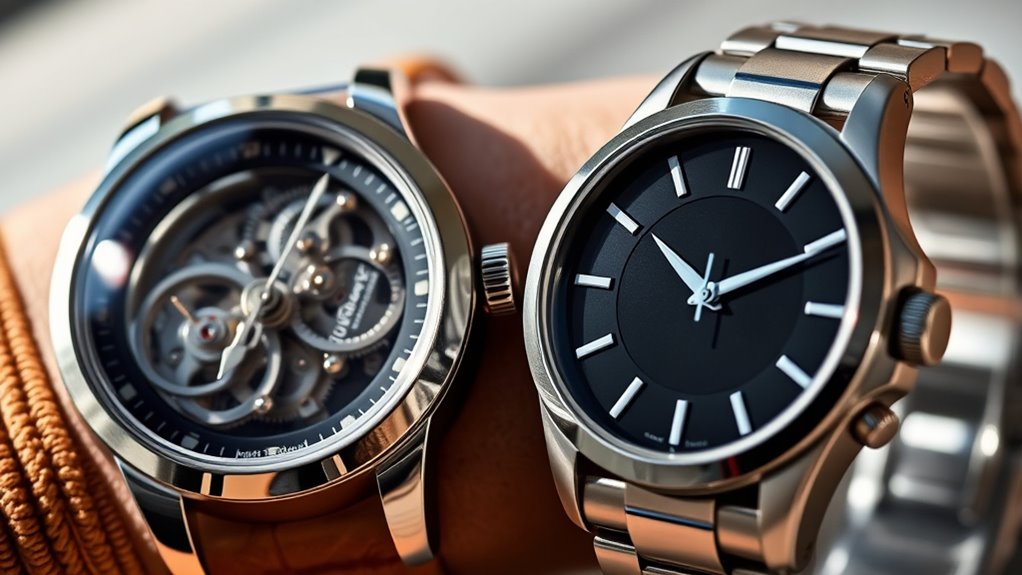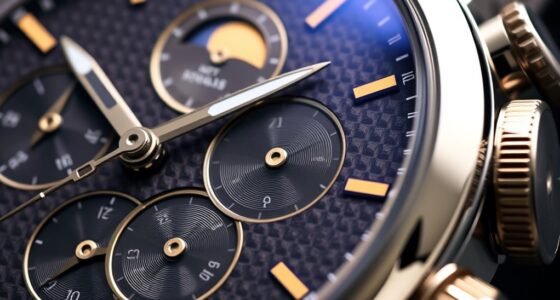Automatic watches run on a mechanical movement powered by your wrist’s motion, showcasing craftsmanship and luxury appeal. Quartz watches use a battery and a vibrating crystal for accurate, low-maintenance timekeeping, making them practical and affordable. Your choice depends on whether you value intricate engineering and tradition or convenience and simplicity. Understanding these differences can help you pick a watch that fits your style and lifestyle—continue to explore to learn more.
Key Takeaways
- Automatic watches are powered by wrist movement and showcase intricate craftsmanship, while quartz watches use batteries and are more straightforward.
- Automatic watches require regular servicing; quartz watches need minimal maintenance, mainly battery replacements.
- Automatic watches are generally more expensive and associated with luxury branding; quartz watches are more affordable and accessible.
- Automatic watches appeal to enthusiasts valuing tradition and craftsmanship; quartz watches suit those prioritizing convenience and reliability.
- The choice impacts cost, maintenance, aesthetics, and lifestyle suitability, making it essential to select based on personal preferences.

When choosing between automatic and quartz watches, understanding how each type functions can help you make an informed decision. Automatic watches rely on a mechanical movement powered by the motion of your wrist. Inside, a rotor spins with your movements, winding the mainspring and storing energy that keeps the watch ticking. This intricate mechanism is often associated with luxury branding, as it showcases fine craftsmanship and engineering. Because of their complex design, automatic watches tend to carry a sense of prestige and timeless appeal. However, they do come with specific maintenance requirements. Regular servicing, usually every few years, is essential to keep the movement running smoothly. The lubricants inside can dry out or degrade over time, leading to inaccuracies or potential damage if neglected. This means you’ll need to invest in professional maintenance to preserve the watch’s performance and value, especially if you want to uphold its luxury status. Additionally, automatic watches often feature skeleton designs that highlight their mechanical complexity and craftsmanship.
On the other hand, quartz watches operate with a battery-powered movement. A small quartz crystal inside acts as a highly precise oscillator, vibrating at a consistent frequency when current is applied. This vibration drives the tiny motor that moves the watch hands. Because of their straightforward mechanism, quartz watches are generally more affordable and accessible, often appealing to those who want reliable timekeeping without the fuss. They require minimal maintenance—typically just battery replacements every one to two years. Unlike automatic watches, they do not need regular servicing to maintain accuracy, making them more convenient for everyday wear. That said, some quartz watches are also branded as luxury items, blending precision with high-end design. But even if they’re not as elaborate mechanically, they still tend to have lower ongoing maintenance costs, making them an attractive choice for those who prioritize ease and reliability.
Ultimately, your choice hinges on what matters most to you: the craftsmanship and prestige associated with automatic watches, which demand more attention and care, or the convenience and cost-effectiveness of quartz watches. If you’re drawn to luxury branding that emphasizes artistry and tradition, an automatic watch might be worth the investment. If you prefer a straightforward, low-maintenance option that keeps perfect time with minimal effort, a quartz watch could be the better fit. Either way, understanding these differences ensures you select a watch that aligns with your lifestyle, aesthetic preferences, and appreciation for quality.
Frequently Asked Questions
Which Type of Watch Is More Accurate Over Time?
You might wonder which watch type keeps better time over time. Generally, quartz watches are more accurate because of their superior mechanical precision and consistent movement, often losing only a few seconds per month. Automatic watches rely on mechanical movement, so they can drift more due to wear and tear. Plus, quartz watches have longer battery longevity, making them a practical choice for daily accuracy.
How Do Maintenance Costs Compare Between Automatic and Quartz Watches?
Imagine your watch surviving a lifetime of adventures without breaking the bank—that’s what maintenance costs can look like. Quartz watches boast incredible battery life, needing a simple battery change every few years, which is cheap and quick. Automatic watches, however, demand frequent servicing, often annually, with higher costs due to intricate mechanics. So, if you want low-cost upkeep, quartz wins, but automatic watches offer longevity with proper care.
Are Automatic Watches Suitable for Everyday Wear?
Yes, automatic watches are perfect for everyday wear, especially if you want to make a luxury appeal and stand out as a fashion statement. They’re durable and require minimal maintenance, making them practical for daily use. Plus, their intricate craftsmanship adds a touch of sophistication to your look. You’ll enjoy the timeless appeal and the sense of connection you get from wearing a finely-made automatic watch every day.
Can Quartz Watches Be Repaired Easily?
Did you know that over 90% of quartz watches can be repaired easily? You’ll find that battery replacement is straightforward, often taking just minutes at a watch repair shop. Unlike automatic watches, which can involve complex repairs, quartz watches typically have simpler repair processes. This means you won’t have to worry about high repair complexity or costly fixes, making quartz watches a practical choice for everyday wear.
Which Watch Type Holds Value Better Over Years?
You’ll find that luxury quartz watches often hold their value well, especially if from reputable brands, thanks to their affordability and accuracy. However, automatic watches tend to appreciate more over time, as collectors prize their craftsmanship and intricate mechanics. So, if your goal is better resale value, investing in a high-end automatic watch might pay off more in the long run. Keep in mind, brand reputation also plays a key role.
Conclusion
Now that you know the differences between automatic and quartz watches, it’s clear each offers unique benefits. Did you know that quartz watches make up over 80% of the global watch market? This shows how reliable and affordable quartz options are for everyday wear. Whether you prefer the craftsmanship of automatic watches or the precision of quartz, understanding these differences helps you make a choice that suits your style and needs perfectly.










